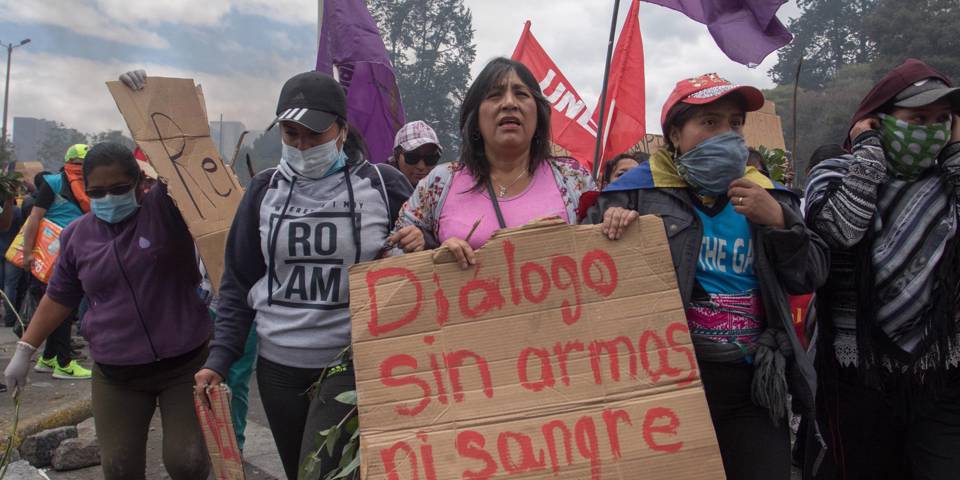Although Latin America has a long development journey ahead of it, the region’s policymakers must now respond urgently to citizens’ demands. By moving quickly to tackle the causes of popular frustration, governments can bolster wellbeing, trust, and long-term prosperity.
Mario Pezzini, Sebastián Nieto Parra, Juan Vázquez Zamora

PARIS – The wave of popular protests that shook Latin America in late 2019 marked a turning point not only in the politics of the countries involved, but also in terms of understanding the region’s long-term development.
The COVID-19 crisis is already affecting living standards and transforming public perceptions and expectations in ways that are still difficult fully to comprehend, much less address. Only by rethinking national social contracts and initiating broad processes of dialogue can policymakers hope to tackle rising discontent and act collectively.
Several key questions must be addressed. What obstacles are stalling the region’s development? Are public institutions equipped to respond appropriately to citizens’ new aspirations and national concerns? And how can citizens be empowered to advance their evolving demands effectively and keep governments accountable?
The protests across the region took many observers by surprise, because Latin America’s socioeconomic situation has improved in the last decade. But the region is now facing three major “development traps” – a set of vicious cycles that are preventing countries from advancing to greater prosperity.
The first trap is institutional. A combination of rising aspirations and increasing popular mistrust and discontent regarding public institutions has undermined “tax morale” – people are less willing to pay taxes. Low tax morale in turn makes it difficult for governments to finance better public services and thus respond to new social demands.
In 2018, for example, just 25% of Latin Americans trusted their national governments, down from 39% in 2006 and only 42% were satisfied with health-care services (versus 57% in 2006).
Perhaps most strikingly, 53% of the region’s population felt justified in not paying their taxes in 2016.
The second trap is one of social vulnerability. Latin America’s macroeconomic progress over the last decade has led to the expansion of a “vulnerable middle class” comprising around 40% of the region’s population. Although people in this group – who earn between $5.50 and $13 per day – are no longer in extreme poverty, they generally have informal jobs, low and unstable incomes, and no social protection. This often prevents them from pursuing better and more stable employment, leaving them – and their families – at constant risk of slipping back into poverty.
Finally, many Latin American countries also face a low-productivity trap. They specialize in unsophisticated primary-sector exports and hence struggle to participate in the higher-value-added segments of global value chains and generate quality jobs. Dependence on commodity exports creates few linkages with the domestic economy, leaving many sectors uncompetitive or technologically backward.
Since the 1950s, for example, Latin America’s labor productivity, relative to the European Union, has fallen from 78% to less than 40%.
In addition to these long-standing structural challenges, Latin American policymakers also must consider the impact of new media and communication technologies. In an increasingly interconnected world, even citizens who are equally well-off materially are more sensitive to wellbeing comparisons with their national and international peers – in terms of age group or gender, for example.
Sectoral administrative measures are necessary but insufficient to address Latin America’s development traps. The region needs a new start. Breaking the dynamic of spiraling frustrations demands nothing less than renewing the foundations of national social pacts, and ensuring that ordinary people’s voices are heard through a process of public deliberation.
This will take time, and each country will need to find its own way of turning a new development vision into an effective national strategy. Nonetheless, we would suggest three starting points.
First, Latin American countries need metrics that capture the multidimensional aspects of citizens’ wellbeing, and thus go beyond traditional macroeconomic indicators such as gross domestic product and the Gini index of income distribution. This is a critical step toward broader-based and more effective policymaking.
To take it, national statistics offices and economic ministries should promote the measurement and pursuit of wellbeing as core policy objectives in official government documents, plans, and budget reports.
Second, while policy responses usually are sector-specific, the issues they seek to tackle are not. As a result, citizens may regard government policies as being disconnected from socioeconomic realities. Instead, Latin America needs strong national development strategies that support coordination among sectors and across levels of government, and contain a clear and explicit policy mix and policymaking sequence. Creating mechanisms to monitor and evaluate implementation of these strategies will be crucial.
Last but not least, Latin America needs participatory strategies that empower citizens at all stages of the policymaking process. National strategies should involve a broad range of actors and draw on a variety of knowledge and viewpoints. Moreover, they need to be place-based, reflecting subnational differences and mobilizing local resources for development.
Although Latin America has a long development journey ahead of it, the region’s policymakers must now respond urgently to citizens’ demands.
By moving quickly to tackle the causes of popular frustration, governments can bolster wellbeing, trust, and long-term prosperity.
Mario Pezzini is Director of the OECD Development Centre and Special Adviser to the OECD Secretary-General on Development.
Sebastián Nieto Parra is an economist at the OECD Development Centre.
Juan Vázquez Zamora is an economist at the OECD Development Centre.
0 comments:
Publicar un comentario